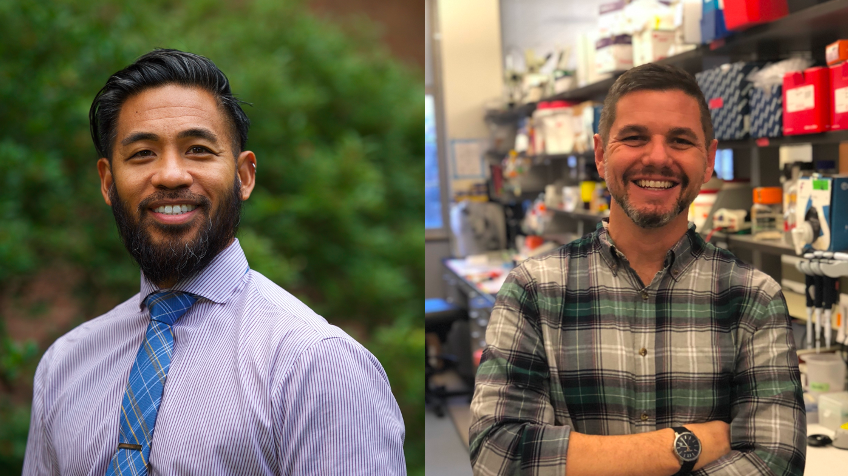Human Science Professors Develop Online Courses in Human Anatomy and Physiology
February 9, 2021 – Two professors in the Department of Human Science at the School of Nursing & Health Studies have developed a series of online courses on human anatomy and physiology.
Dr. Ted Nelson, associate professor, will offer the four-credit “Anatomy & Physiology I” between May 24 and July 2, 2021, and Dr. Jason Tilan, associate professor, will offer the four-credit “Anatomy & Physiology II” from July 6 to August 13, 2021. Both courses have a laboratory component.
These online courses, which feature synchronous and asynchronous content, are often required as a part of health-related academic programs. Both are available for non-degree students pursuing a health-based education who wish to fulfill prerequisite requirements.
‘Share My Passion’
For the past few years, Nelson has taught a version of this course on campus to first-year undergraduate students. He said he has enjoyed the process of taking the course content into the virtual space.
“Developing this series of online courses required me to think creatively about how the material is presented,” Nelson said. “Overall, this gave me a fresh perspective. I’ve been able to take many of the lessons learned and apply them to my regular courses during Georgetown’s transition to a virtual format during this pandemic. I plan to continue to think creatively about my teaching going forward for both my on-campus and online courses.”
Nelson added that he is passionate about the content and looks forward to sharing that “passion with a wider student population interested in health and the human body.”
“I tell all of my students that, for anyone who is alive, there is no subject material for study more relevant than the content of these courses,” he said.
‘Scientific Foundation’
Tilan noted that the courses are very applicable to individuals studying in the health sciences.
“These courses have long served as the scientific foundation for future health care professionals, biomedical researchers, and public health practitioners from NHS,” he said. “As architects of these courses and instructors within them, we will have the privilege to not only teach content we are passionate about, but frame the science and its applicability in ways consistent with the Jesuit values and mission of the school that we hold dear.”
The professor highlighted the way science and health care align with values of service.
“Finally, given that these courses can serve as prerequisites for graduate programs and second degrees related to health, in general, we are excited by this opportunity to mentor students with a call to serve others through science and health care,” Tilan said.
From the Syllabi
Nelson and Tilan collaborated with Stasia Levin, senior director of marketing and business strategy at NHS, and the School of Continuing Studies to bring the coursework online. These are the first online non-degree lab courses being offered through the partnership between NHS and SCS.
Anatomy & Physiology I is the first of a two-semester course sequence that covers general biological principles, human anatomy, and human physiology. These courses provide students with a foundation for each major organ system’s structure and function; requiring study of these systems from both a gross and detailed perspective. In this first installment students will be required to master topics in cell structure and function, gross anatomy, and histology. This foundation allows progression to more complex topics in the areas of integumentary, skeletal, muscle, and nervous physiology later in the semester.
Anatomy & Physiology II is the second of a two-course sequence that covers the anatomical and physiological aspects of the human body. These courses provide students with a foundation for each major organ system’s structure and function, requiring the study of these systems from both a gross and detailed perspective. In this second installment, students will bring together principles of structure and function to understand individual and collective contributions of the following systems of physiology to the human body: endocrine, reproductive, blood, immune, cardiovascular, respiratory, urinary and renal, and gastrointestinal. Laboratory will consist of the application of principles of structure and function via hands-on exercises in a system-specific manner.
Learn more about registering for the courses.
Bill Cessato

